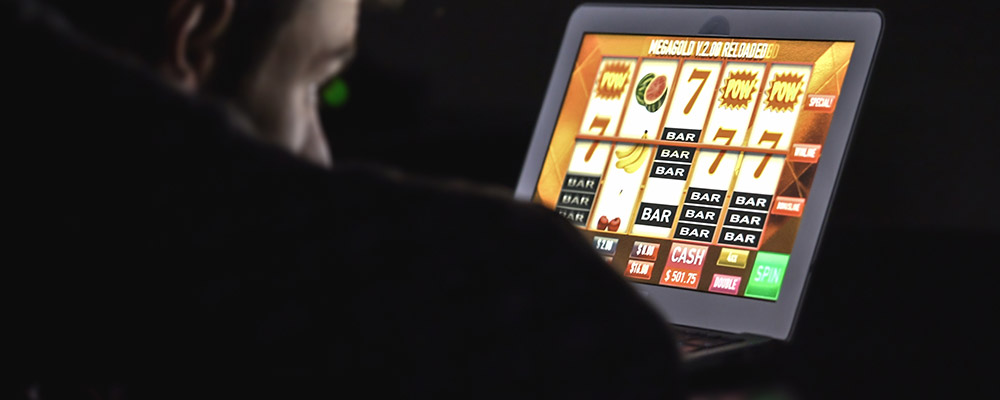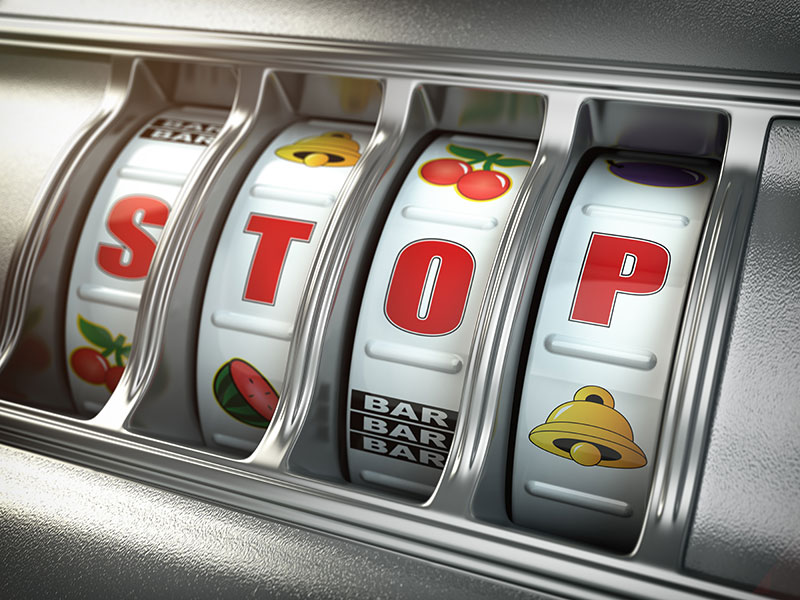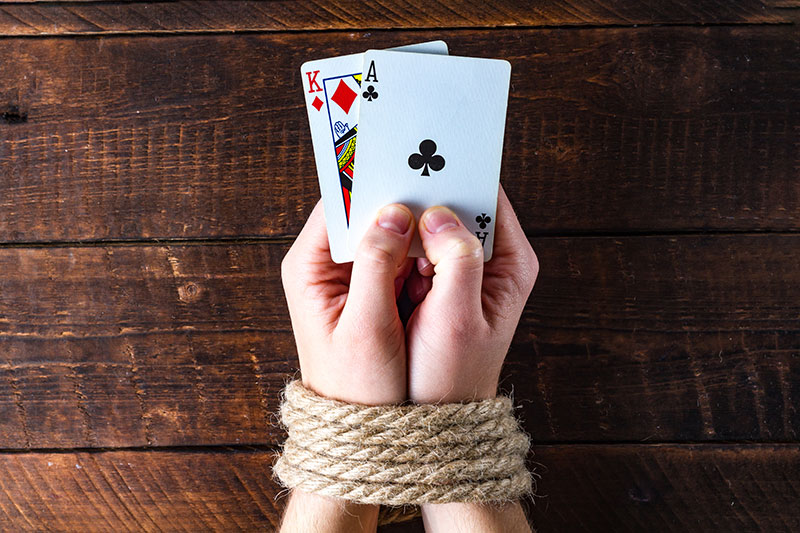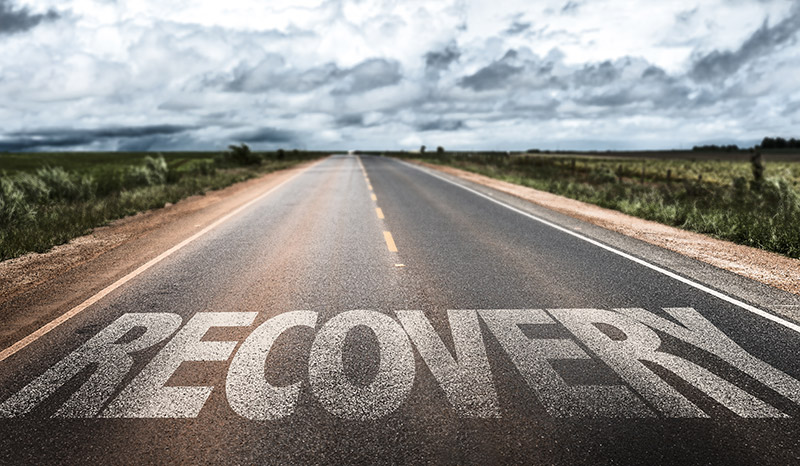Gambling Addiction
The biggest step to overcoming a gambling addiction or problem is admitting that you have a problem, it takes tremendous strength and courage to own up to this, especially if you have lost a lot of money and strained or broken relationships along the way.
Don’t allow despair to hold back your recovery, and don’t try to go at it alone, other people have been in your shoes and have been able to break the habit and rebuild their lives. You can, too.
What is gambling addiction (problem gambling)?
A gambling addiction, also known as pathological gambling, compulsive gambling, or gambling disorder—is an impulse-control disorder and like other addictions (such as drug addiction or alcohol addiction), is where you suffer from an uncontrollable urge to continually do something, in this case, gambling.
The DSM-5 (Diagnostic and Statistical Manual of Mental Disorders, 5th Edition) defines gambling as “persistent and recurrent problematic gambling behavior leading to clinically significant impairment or distress” of four or more specific actions over 12 months.

Why do people gamble?
Understanding why you gamble will be beneficial to your treatment, do you gamble:
- When you are lonely & bored?
- After a stress-filled day at work?
- After an argument with a loved one?
- To solve money problems?
- To numb unpleasant feelings or escape problems?
You may be looking towards gambling as a way to soothe unpleasant emotions, socialise or just unwind.
Gambling is also addictive if you are looking for excitement or that adrenaline rush, gambling stimulates the rewards centres of your brain and over time the levels of ‘pleasure’ you feel lower as these centres weaken. There then becomes an increased need for dopamine and the abuse cycle continues.
Types of Gambling
There are two main types of gambling:
- Chance-based – such as playing the lottery, roulette, bingo, or gaming machines. The results are random. All players have an equal chance of winning.
- Skill-based gambling – such as betting on races and playing poker or blackjack. Your ability or skill can influence whether you win or lose.
Remember that no gambling has a ‘sure bet’ winning formula and generally the odds are in favour of the house.
Both the above types of gambling are available at casinos, certain pubs even online providing plenty of opportunities for a gambling problem to arise.
The stages of Gambling Addiction
1. Frequent Gamblers
Also known as serious or heavy gamblers where gambling is an important part of your life and would be missed if you could not engage in it. At this point gambling has not diminished your work performance or focus, nor has it changed your financial situation through increased wagers or excessive irresponsible borrowing of money.
2. Social Gambling
Gambling episodes are usually infrequent, but there may be some regular activity as well (e.g., a monthly poker game, a weekly or even daily lottery.
3, Problem Gamblers
Where your gambling has resulted in at least one negative consequence to you or a loved one, this would include relationship problems. Money that should be allocated to other responsibilities gets put towards gambling. At this point you may be in denial or trying to hide the financial situation you are in by borrowing money, gambling to try to win back losses, and spending unreasonable time gambling.
4. Compulsive or Pathological Gamblers
At this point in your addiction, you may be unable to quit, your relationships, employment, and financial situation may be destroyed. This is the only ‘type’ of gambler that has been fully defined by the American Psychiatric Association as suffering from a mental disorder and meets the disorder criteria as listed in the DSM-5
The Causes of Gambling Addiction
There have been studies to assess what puts a person at risk of developing a gambling problem, (https://www.who.int/docs/default-source/substance-use/the-epidemiology-and-impact-of-gambling-disorder-and-other-gambling-relate-harm.pdf?sfvrsn=5901c849_2)
- There is a correlation between the availability of gambling outlets (slot machines, online sites, lotto machines, betting houses, etc) and the increase of gambling problems in certain areas.
- Starting to gamble from a young age
- Social and economic disadvantages increase the risk of gambling
- Relapse in cases of problem gamblers, leading to an increased gambling trend
- Pre-existing substance abuse or dependence
- Pre-existing behavioral addictions
- Pre-existing mental health disorders – Bi-polar, Schizophrenia, low serotonin levels
- Childhood abuse and trauma can be a predictor
- Genetics – An underactive brain reward system.
Less activation of the prefrontal cortex.
Enter your phone number below and one of our qualified addiction specialists will get in touch to discuss your options.

Signs and Symptoms of Gambling Addiction
The NHS (https://www.nhs.uk/live-well/healthy-body/gambling-addiction/) suggests asking yourself the following questions:
- Do you bet more than you can afford to lose?
- Do you need to gamble with larger amounts of money to get the same feeling?
- Have you tried to win back money you have lost (chasing losses)?
- Have you borrowed money or sold anything to get money to gamble?
- Have you wondered whether you have a problem with gambling?
- Has your gambling caused you any health problems, including feelings of stress or anxiety?
- Have other people criticised your betting or told you that you had a gambling problem (regardless of whether or not you thought it was true)?
- Has your gambling caused any financial problems for you or your household?
- Have you ever felt guilty about the way you gamble or what happens when you gamble?
Score 0 for each time you answer “never”
Score 1 for each time you answer “sometimes”
Score 2 for each time you answer “most of the time”
Score 3 for each time you answer “almost always”
If your total score is 8 or higher, you may be a problem gambler.
The Dangers of Problem Gambling
The pre-occupation with gambling can supersede other areas of your life putting important things like relationships, employment, financial stability, sobriety (in the case of a dual addiction) as well as your mental health at risk.
The changes to your dopamine levels and the effects on the pleasure centres of your brain can increase the severity of any other mental health issues you may have.
By far the biggest danger for problem gamblers is the increased risk of suicide, while in theory there are limits to how much you can drink or abuse substances, gambling addicts could lose large amounts of money in a very short period of time.

Problem Gambling and Substance Abuse
There has been shown, a strong correlation between substance abuse and gambling where substance abuse is shown to be a robust predictor of problematic gambling. The co-occurrence of gambling and alcohol or cocaine use disorders is not uncommon, in the same way that those struggling with drug addiction often abuse more than one substance (including alcohol).

Treatment Options for Gambling Addiction (please also mention Gamestop)
A gambling problem is often associated with other behavior or mood disorders. You or your loved one may also suffer from substance abuse issues, unmanaged ADHD, stress, depression, anxiety, or bipolar disorder.
To overcome your gambling problems, you’ll also need to address these and any other underlying causes as well. Thankfully you are not powerless to stop, there are treatment options available for gambling addictions, these options are similar to treatments for other addictions:
Private treatment in a residential treatment centre:
Private residential rehab is often the preferred choice for treating addiction. Because gambling is very accessible, being away from those triggers (including mobile devices) for a period of time in conjunction with extensive rehab therapy will help you overcome gambling addiction. The best form of therapy for gambling addiction is CBT, but most residential rehab timetables use a combination of therapeutic approaches and creative workshops known as “holistic therapy”.
Cognitive Behavioural Therapy
CBT is a talking therapy that works on the concept that your thoughts, feelings, physical sensations, and actions are connected and that the vicious cycle addiction has trapped you in is through negative thoughts and feelings.
Focus is placed on your current state of mind and the problems you are experiencing rather than on the repair of past problems, therapy offers up practical and achievable ways to improve your mental state every day.
Dialectical Behaviour Therapy (DBT)
Though a form of CBT, the main difference is DBT promotes change by improving emotional stability through experience and behavioral validation. Behavior modification by challenging faulty or negative thought patterns and belief systems.
Both behavioral therapies rely on therapy in both group and individual settings and promote skills training to help you learn how to cope with the urges, and impulse control issues gambling feeds on.
Free or non-profit treatment & Support Groups:
SMART Recovery UK, is a free, nonprofit, Self Management and Recovery Training programme available to help assist in the recovery process of addiction. https://www.smartrecovery.org/gambling-addiction/
The SMART Recovery approach to recovery is summarized in the Four-Point program.
SMART Recovery teaches how to:
- Enhance and maintain motivation to abstain
- Cope with urges
- Manage thoughts, feelings, and behaviors
- Balance momentary and enduring satisfactions
(https://www.smartrecovery.org/about-us/frequently-asked-questions/)
National Problem Gambling Clinic – jointly commissioned by GambleAware and NHS England. https://www.cnwl.nhs.uk/services/mental-health-services/addictions-and-substance-misuse/national-problem-gambling-clinic
GamCare (https://www.gamcare.org.uk/) offers free information, support, and counselling for problem gamblers in the UK. And runs the National Gambling Helpline (0808 8020 133) as well as also offering face-to-face counselling.
Gamblers Anonymous (https://www.gamblersanonymous.org.uk/) run local support groups that use the same 12-step approach to recovery from addiction as Alcoholics Anonymous. There are also GamAnon (http://gamanon.org.uk/) support groups for friends and family.
